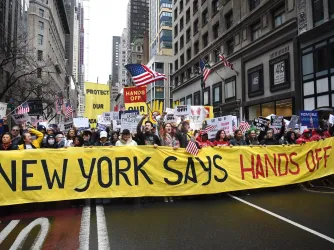Table of Contents
Alaska state rep faces potential disqualification from office under ‘disloyalty’ clause

Gallagher Photography / Shutterstock.com
Supporters of former President Donald Trump surround the U.S. Capitol building on January 6, 2021.
UPDATE (Dec. 27, 2022):
Following a seven-day bench trial, an Alaska state court ruled that Rep. David Eastman’s membership in the Oath Keepers does not disqualify him from office under the state constitution’s “disloyalty” clause.
The court construed the provision narrowly to harmonize it with the First Amendment, which bars the government from denying rights or privileges to citizens for their mere association with an organization that advocates or engages in unlawful activity. Rather, the court reasoned, an individual must have “a specific intent to further the unprotected words or conduct” of the organization to be disqualified from office. The court relies on Supreme Court precedent drawing a “critical line . . . between mere advocacy and advocacy ‘directed to inciting or producing imminent lawless action and . . . likely to incite or produce such action.’” The court found that while the Oath Keepers crossed that line based on its founder’s and other members’ actions on and leading up to Jan. 6, Eastman had no specific intent to aid their unlawful conduct.
The court’s ruling is a win for the First Amendment and a reminder that guilt by association has no place in our constitutional republic.
“Are you now or have you ever been a member of the Communist Party?”
It’s a question that evokes the dark, bygone era of McCarthyism, when the government probed its citizens’ allegedly subversive views and associations. But that era may not be so bygone after all, as a court considers whether to disqualify an elected official from office for “disloyalty.”
Last month, voters in Alaska awarded state Rep. David Eastman a fourth term in office. He won the race by nearly 25 points. But thanks to an antiquated and unconstitutional “disloyalty” clause in Alaska’s state constitution, Eastman’s political career might be over.
More than a decade ago, Eastman joined the Oath Keepers, an organization that describes itself as a “group of proud American Patriots who are dedicated to upholding the constitution of the United States.” Eastman says the group’s “only requirement for membership is a commitment to honor the oath that we each have taken as public servants to support and defend the constitution.”
But not everyone sees the group the same way.
The Oath Keepers made headlines in 2021 after several members, including the group’s founder Stewart Rhodes, participated, or were involved behind the scenes, in the Jan. 6 Capitol riot. Last month, Rhodes and another group leader were convicted of seditious conspiracy for their plot to violently overturn the 2020 presidential election. Trials for other members of the group for their roles in Jan. 6 are pending.
Alaska joined the union during the Second Red Scare, and the disloyalty clause arose from worries about subversive communist influence and tensions with the Soviet Union.
Eastman attended former President Trump’s rally preceding the Jan. 6 riot, but he hasn’t been convicted or even accused of entering the Capitol or attempting to overthrow the government.
Still, Eastman’s decision to join the Oath Keepers more than 10 years ago is coming back to haunt him. Earlier this year, Alaska resident Randall Kowalke filed suit against Eastman claiming his membership in the Oath Keepers disqualifies him from holding public office in Alaska under the state constitution’s “Disqualification for Disloyalty” provision, which provides:
No person who advocates, or who aids or belongs to any party or organization or association which advocates, the overthrow by force or violence of the government of the United States or of the State shall be qualified to hold any public office of trust or profit under this constitution.
Eastman’s trial is ongoing.
Alaska joined the union during the Second Red Scare, and the disloyalty clause arose from worries about subversive communist influence and tensions with the Soviet Union. Now, that antiquated provision is being tested for the first time against someone on the political right, perfectly illustrating how eroding freedom to weaken your political enemies is an unwise strategy in the long term.
As Supreme Court Justice Robert H. Jackson wrote nearly 80 years ago, “If there is any fixed star in our constitutional constellation, it is that no official, high or petty, can prescribe what shall be orthodox in politics, nationalism, religion, or other matters of opinion or force citizens to confess by word or act their faith therein.” The true test of freedom, he said, is “the right to differ as to things that touch the heart of the existing order.”
The government can punish those who actually conspire, or attempt, to overthrow the government, but there is no evidence Eastman did either of these things. The First Amendment protects your right to “say you want a revolution,” in the words of John Lennon. It likewise protects your mere association with those who call for toppling the government by force.
In 1967, the Supreme Court in Keyishian v. Board of Regents held that a public university faculty member’s membership in a subversive group could not alone be grounds for termination. That same year, California’s highest court held the First Amendment barred the state from requiring its employees to take an oath affirming, “I do not advocate, nor am I a member of any party or organization, political or otherwise, that now advocates the overthrow of the Government of the United States or of the State of California by force or violence or other unlawful means.” Sound familiar?
A free society has confidence it will survive the expression of even the most outrageous, abhorrent views.
As FIRE recently observed, the First Amendment itself was “written and ratified by men who advocated for overturning a standing government — and did so.” The Court has recognized that speech “may indeed best serve its high purpose when it induces a condition of unrest, creates dissatisfaction with conditions as they are, or even stirs people to anger.” The First Amendment rightly protects such speech unless it is intended, and likely, to incite imminent lawless action. A looser standard would inevitably lead to the government crushing dissent under the guise of preserving domestic security — just look at what’s happening right now in countries like China and Turkey.
A free society has confidence it will survive the expression of even the most outrageous, abhorrent views. It recognizes that empowering the state to decide which beliefs are acceptable to express is a recipe for tyranny.
FIRE will continue to watch the case against Eastman with interest.
Recent Articles
Get the latest free speech news and analysis from FIRE.

Fandom’s lighthouse in a sea of censorship

FIRE statement on Stephen Colbert’s James Talarico interview and continued FCC pressure

Deep dive into New York’s proposals to ban demonstrations near houses of worship


